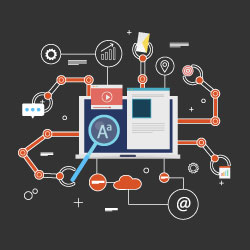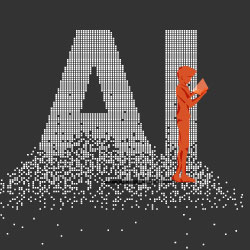A blog by Gabriel Barnes
Managing change is an age-old problem for businesses, and yet the scale of change that we have seen recently, and the sheer agility with which organisations have had to adapt, has posed certain novel challenges for leaders managing these transformations. In this process, some important questions have arisen.
- How do you manage a complete overhaul of the operational model?
- Meanwhile, how do you consistently ensure employee engagement and effective collaboration?
- Which skills must be prioritised and developed, and how can this be done efficiently?
- How do you change the mindset of a body of employees adapting to significant changes, all the while maintaining authentic leadership and nurturing trust?
As discussed in previous blogs in this series, where other people management techniques with which Artificial Intelligence can help have been explored, it is the cost-effectiveness, the personalisation, and the capacity for real-time insights that make digital solutions a crucial component in addressing these questions and managing change.

How Artificial Intelligence is already facilitating change and transformation
Tools based in Artificial Intelligence designed to assist periods of change and transformation had existed long before the advent of the coronavirus crisis, but the implementation of these tools has now increased to the point of being irreversible.
These digital solutions have proved enormously helpful with the shift to remote working, analysing the jobs that need to be done and the people that are available to do them, and assessing what work can be done virtually, what work can be augmented or automated to fit this new model, and how workforces must be up skilled to adapt to this.
For example, certain necessary tasks from before the age of remote working are now being re-initiated with the help of digital tools. Artificial Intelligence is becoming a key part of the onboarding process for companies, with assessments and induction programmes for virtual internships and graduate schemes already beginning to take place online.

The future of Artificial Intelligence in change and transformation
The use of Artificial Intelligence to help leaders manage this change and transformation is set only to increase. In the not-too-distant past, the management of change and transformation mostly comprised two-to-three-year long initiatives, the support of consultants, and the use of technology in a limited way around project modelling, costing, and management.
Both the nature of change and transformation initiatives and the extent to which they are facilitated by digital tools will soon look very different. Sophisticated technology, such two-way bot communication, gamification, and augmented reality, will lie at the heart of this.
- Digital solutions to facilitate agile workplace planning are to become more commonplace, helping organisations to analyse costs and areas of efficiency, and make decisions about what tasks require development or re-modelling.
- Artificial Intelligence platforms will be crucial in maintaining employee engagement and assisting with mindset change. The use of these tools will represent an evolution of the ‘old way’ of measuring employee engagement, which relied principally on semi-regular surveys, to advanced techniques of personalising content for employees and providing real-time insights for employers.
- Digital skills will no longer be seen as esoteric, relevant only to a small pool of workers, but necessary for all individuals at all levels of the organisation to have. This transformation of skills and capabilities will be facilitated in a cost-effective way by tools based in Artificial Intelligence.
- As it will soon become the case that nearly every interaction between employee’s takes place online, the wealth of information available in chat rooms and emails will become an important resource for leaders looking for insights into their workforces. Organisation Network Analysis can provide this in a non-intrusive way.
Introducing AI in a practical way
We have seen how crucial the support Artificial Intelligence will become in the near future, and the numerous ways in which these tools can facilitate change and transformation. However, when building a business case for these changes, it is necessary to demonstrate the potential for a high Return on Investment which makes implementing these digital solutions worthwhile when looking to evolve change and transformation initiatives.
A useful low-risk way to test the applications of digital solutions is to pilot them initially, conducting a trial in a small team or around a specific issue, before scaling up if successful.
The HR Tech Partnership (HRTP) runs a human capital digital innovation hub which can facilitate this low-budget innovation in HR so that leaders do not have to make large commitments in the first instance.

